Common Sense Media Is Now Reviewing Podcasts
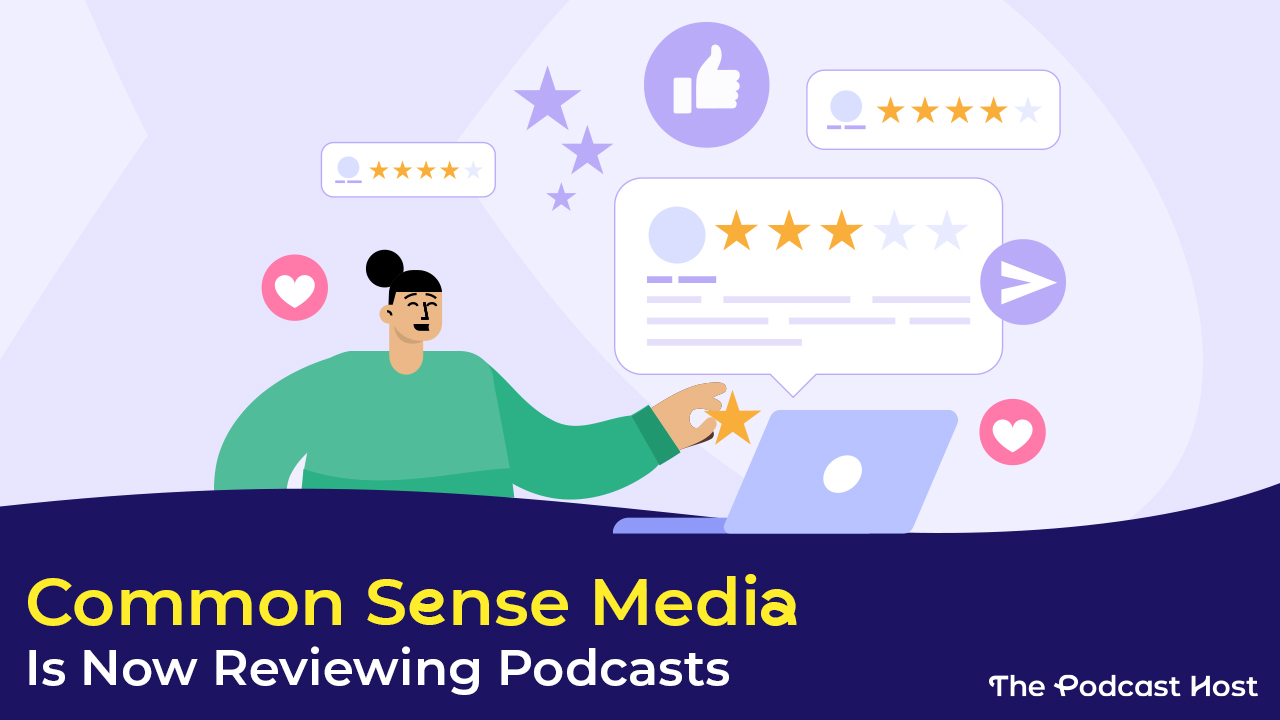
Podcasts for kids have enjoyed a boom over the last couple of years. According to NPR and Edison Research’s 2021 Spoken Word Audio Report, listenership has increased for kids and family podcasts by 20%.
As a result, Common Sense Media has plenty of good reasons to add podcasts to its review slate. Podcast enthusiasts can find more quality content to share with young people in their lives. What does this mean for the average independent podcaster? Common Sense Media’s podcast reviews can help you focus your show notes, improve your SEO, and grow your audience.
What Is Common Sense Media?
Common Sense Media is a non-profit organization that helps parents and caregivers, educators, and advocates find and share kid-friendly content. They index and review books, movies, tv shows, games & apps, and now, podcasts.
The content they review includes entertainment not meant for kids but could pique their curiosity, such as Bullet Train. Tons of new digital content launches daily, and it’s tough to separate the wheat from the chaff. Common Sense Media helps people find what they want easily.
What Does Common Sense Media Do for Podcast Listeners?
Their index, filters, descriptions, and reviews (both curated and user-contributed) let you know what’s in the content without spoiling the story or intention. A starting point is Common Sense Media’s lists of recommendations, filtered by age-appropriateness.
You can also search by topic, genre, and/or character strengths. When you know the type of content that you want to share with a kid, this is an easy way to find good podcasts. Users can browse a limited number of reviews for free or purchase a membership for $30 a year.
What Does Common Sense Media Do for Podcasters?
If you already make a podcast for kids, your show should be on Common Sense Media’s list. If it’s not, you can write to them about your show and ask them to include it. You need to send:
- The title of the show and a link to your podcast website
- High-quality artwork used in the title card for streaming platforms
- 3-4 episodes you feel embody the intention of the podcast (your “greatest hits,” so to speak)
- A summary of the podcast
- A blurb describing the impetus, intention, and any other background information the general listener wouldn’t know just from listening
- Any other prevalent information we should consider when reviewing, such as distinguished voices or perspectives, diversity, equality and inclusion aspects, educational background, and so on.
For example, here’s the Common Sense Media review of WHYY’S podcast, Eleanor Amplified.
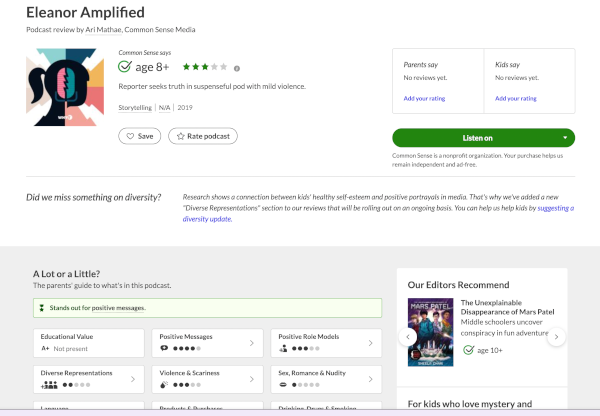
Were this your podcast, this would be a great link to include in a media kit. It shows an unbiased report of what’s in your show without giving away the fun stuff. Like the ingredients list and nutrition information on the side of a tin, it tells you what’s in it and what you’ll get out of it without spoiling the flavor.
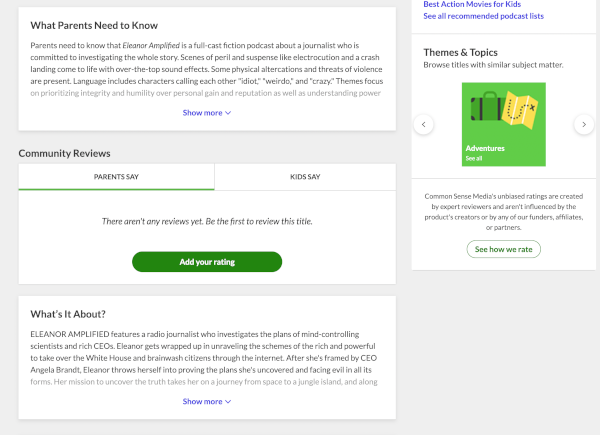
What if you don’t make a kids’ podcast? What can Common Sense Media’s review style do for you?
This System Can Help You Focus Your Show Notes
Understanding the criteria Common Sense Media uses to rate shows can help you focus your podcast promotion.
Open-ended questions are good to ask yourself (or your trusted friends) when you plan your podcast promotion. “What’s it about” may seem obvious, but “What does the audience need to know in advance” is something your show notes and media kit might not already include. The “Talk to Your Kids About” section can help you think about what questions your show should raise for your audience and inform your call to action.
Instead of content warnings, Common Sense Media uses a rating scale of 1-5 for different elements, such as violence, educational value, or objectionable language. For example, if you have a history or true crime podcast, you may want to use this scale to describe certain elements. Suppose your history podcast episode about the Lincoln assassination has a violence level of 3 out of 5. In that case, your episode about the attempt on Gerald Ford’s life might be a 1 out of 5, and the Kennedy episode could merit a five, by comparison.
If you can make that rating scale into something fun that aligns with your brand, even better. For example, the true crime and paranormal comedy podcast, A Paranormal Chicks use the word “creep” in their affiliate marketing, which has five letters. A 3 out of 5 could be a CRE__, a 4 out of 5 could be a CREE_, and so on.
Improve Your SEO
The clearer your episode description is in your show notes, the more likely it is to appear in a search.
When you use a standard template for your show notes, you can complete them more efficiently. I’ll show you this by taking some elements of Common Sense media’s review system and applying them to the show notes of a podcast that’s not specifically intended for children.
Case Study: Organic Life
As an example of show notes, let’s use an episode of Organic Life. Maybe this podcast could get kids to eat their vegetables, but maybe not. It’s a podcast for people interested in cooking, food, and nutrition. There’s nothing wrong with the show notes for Episode 9. But could they be more detailed?
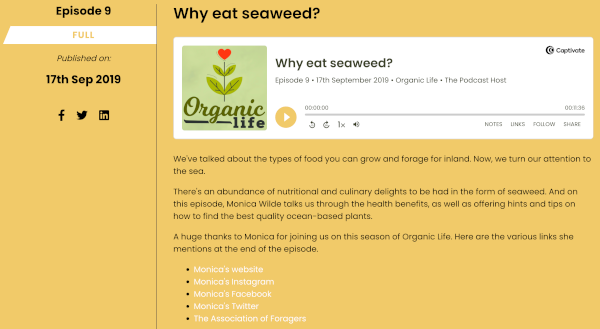
What If You Apply Common Sense Media’s Format to This Podcast Episode?
On a scale of one to five, how does Episode 9 of Organic Life rate for:
- Educational value? This episode has helpful, detailed information about nutrition and the natural world, so this is a 5 out of 5.
- Positive messages? The host and guest are calmly happy about nutrition and foraging, so a four out of five feels right.
- Positive role models? It’s an interview with a professional forager who respects the environment and wants people to eat healthy food, so I give it a five.
- Sex, romance, and nudity? There isn’t any. They’re talking about foraging seaweed, food preparation, and nutrition. I’d give it a one.
- Violence and scariness? Again, a one out of five. If you find seaweed scary, wait till you find out about mushrooms.
Common Sense media’s ratings scaled for content warnings don’t apply to every kind of podcast. But it’s an excellent way to think outside your preconceived notions about your own podcast. Using Common Sense Media’s criteria, you can include the benefits or content warnings that best prepare your audience for the episode.
What Does The Audience Need to Know Before Listening to This Episode?
The podcast’s short description is, “Are you interested in eating and living in a healthier, more sustainable way? A way that works with nature, instead of against it?” Straight away, the audience knows this show is about eating, health, sustainability, and working with nature. What else do they need to know?
This show is about food not found in a box on your local grocery shelf. Ingredients such as seaweed, wild herbs, and nettles might surprise some folks. Mushrooms are common enough that people can be complacent and make mistakes when selecting or preparing them. So, it’s good to include guidance to encourage people to learn from professionals and not hurt or poison themselves.
Reviews
Podchaser allows users to review individual episodes. This would be a great place to copy and paste a review’s text, or link to the review on Podchaser.

If you get a great review of a particular episode, why not include it in your show notes? You should put it on your website, media kit and social media posts. In the show notes, even simply “surprising, quick and informative,” with a link to the original review, can persuade new folks to download it.
Questions for Discussion
Kids always have questions about the story they just heard or the show they just watched. It’s part of how they learn. Common Sense Media’s review system helps adults answer kids’ questions and ask the kids questions for further discussion.
Adults tend to keep their questions to themselves. But, their questions can help you put your show in context and make it more accessible. Not only that, questions can make your show more visible in search engines.
Imagine your ideal listener, and ask yourself what questions they might have. Google loves direct-answer questions. If your podcast has a question and the answer in its show notes and blog posts, Google can latch onto that. They may even prioritize your information as a Featured Snippet.
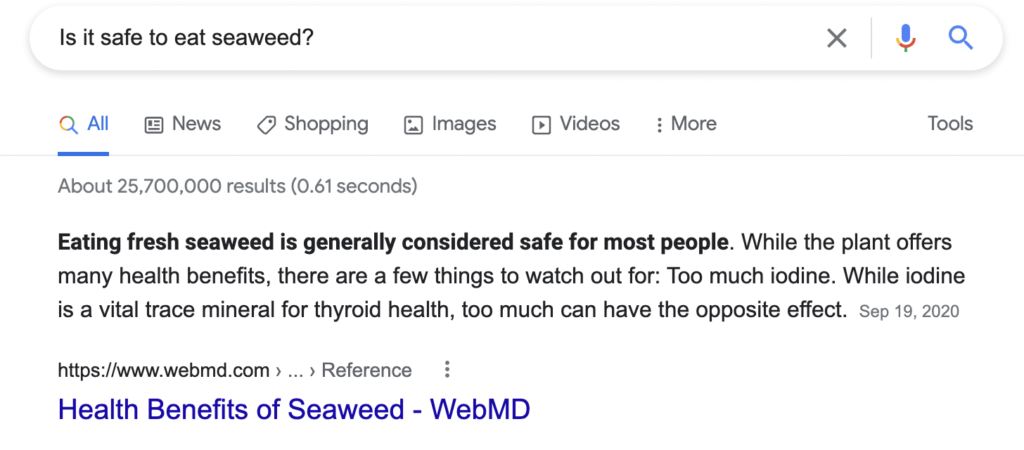
People are likely to type in a question they need the answer to, or use voice search, particularly with a smart assistant like Alexa or Siri. Try including the question you imagine your ideal listener would ask, and then answer it.
“Is it safe to eat seaweed?”
“Some people don’t, but it’s on the menu at many Asian restaurants worldwide. In this episode, we’ll show you seaweed’s health benefits, and you may want to try it.”
These kinds of questions can make your podcast episode rank higher in searches, whether related to podcasts or not. Relevant questions and answers can bring in a new audience. Common Sense Media uses questions throughout their site’s resources, such as “What’s the Right Age to Get Kids a Cellphone?” or “What is Cyberbullying?” This helps more people find their site for related topics, not only people searching for entertainment reviews.

Common Sense Media’s Review System Helps You Use ‘Beginner’s Mind’ to Grow Your Show.
Beginner’s Mind is a concept where you come to a situation as if it’s completely new. It’s also called the “child mind.” When you’ve worked really hard on your podcast, it’s hard to see it objectively. You’re more likely to see it as generally “good” and less likely to see how it answers a question or entertains. When you use a system like Common Sense Media’s comprehensive review system to examine and describe your show, your promotion will be more focused, objective, and accurate.
